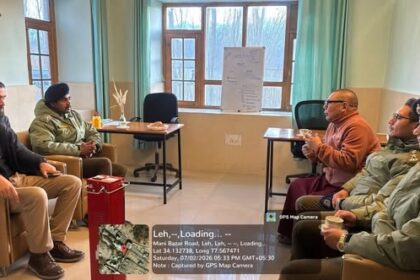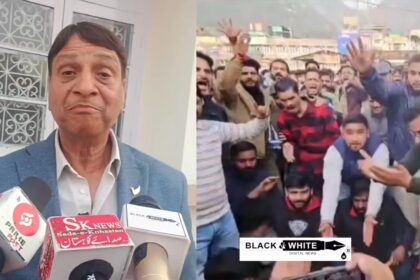||Black and White Digital News ||
||August 14,2024 ||
Jaipur: In a deeply troubling incident, the Jaipur police allegedly assaulted an Indian Army commando, Arvind, who is currently stationed in Jammu & Kashmir. The incident occurred when Arvind visited a local police station to inquire about a legal matter involving a fellow soldier. Instead of receiving assistance, Arvind was reportedly stripped and beaten with sticks by police officers, who allegedly made derogatory remarks, claiming their superiority over the Indian Army.
This incident has ignited widespread condemnation across the nation, drawing attention to the conduct of law enforcement agencies in their interactions with military personnel. Union Minister Rajyavardhan Singh Rathore, a retired Colonel of the Indian Army, took immediate action by personally visiting the police station where the assault took place. Rathore is reported to have reprimanded the Assistant Commissioner of Police (ACP) involved in the incident, highlighting the gravity of the situation.
Expanded Analysis:
The assault on Commando Arvind has raised serious concerns about the treatment of armed forces personnel by civilian authorities. Arvind, who serves in one of the most challenging environments in India, went to the Jaipur police station as a responsible citizen, hoping to assist a fellow soldier involved in a legal case. However, the encounter turned violent, with the police allegedly subjecting him to physical abuse and humiliation.
Eyewitness accounts suggest that the police officers not only physically assaulted Arvind but also made inflammatory statements that sought to undermine the dignity and status of the Indian Army. This behavior has been widely condemned as both disrespectful and dangerous, given the critical role that the armed forces play in maintaining national security.
Minister Rajyavardhan Singh Rathore’s intervention in the matter underscores the seriousness with which the incident is being taken at the highest levels of government. Rathore’s military background and strong advocacy for the rights and respect of armed forces personnel add significant weight to his actions. His immediate visit to the police station and the subsequent dressing down of the ACP involved send a clear message that such conduct will not be tolerated.
Broader Implications:
The incident has sparked a broader debate about the relationship between the military and civilian law enforcement in India. Veterans’ associations and other groups have expressed outrage, demanding swift justice for Arvind and calling for systemic changes to ensure that similar incidents do not occur in the future. There are growing calls for the implementation of stricter guidelines on how police interact with military personnel, particularly those who are on active duty.
This incident also brings to light the need for increased sensitivity and respect for the armed forces within civilian institutions. The Indian Army, revered for its role in defending the nation, deserves a level of respect and consideration that was clearly absent in this case. The Jaipur incident has the potential to strain relations between the military and the police, two institutions that must work in concert for the nation’s security and stability.
Political and Social Reactions:
The incident has not only drawn attention from government officials but has also resonated with the public, many of whom view the assault as an affront to the nation’s pride in its armed forces. Social media platforms are abuzz with calls for accountability, and there is growing pressure on the Rajasthan state government to take decisive action against the officers involved.
Opposition parties have also weighed in, criticizing the state government for the lack of oversight and demanding immediate corrective measures. The incident is expected to have significant political ramifications, especially in the context of the ongoing debate about law enforcement practices and the treatment of military personnel.
As the investigation into the assault on Commando Arvind continues, the incident stands as a stark reminder of the need for mutual respect and cooperation between civilian and military institutions. The outcome of this case will likely set a precedent for how such incidents are handled in the future, with the potential to shape the broader discourse on civil-military relations in India. Minister Rathore’s swift and decisive response has brought the issue to the forefront of national consciousness, ensuring that justice for Arvind is pursued with the urgency and seriousness it deserves.
Leave a comment
You Might Also Like
SSP Leh Along with District Officials Visit De-Addiction Centre Leh, Encourage Patients Towards Recovery and Rehabilitation
SSP Leh Along with District Officials Visit De-Addiction Centre Leh, Encourage Patients Towards Recovery and Rehabilitation Leh, Feb 9: Today,…
1 Min Read
Katra Roop Way Bun Kar Rehega MLA Katra Baldev Raj Sharma Ka Bayan Me Jeeta He Isi Promise Pe Hu
Katra Roop Way Bun Kar Rehega MLA Katra Baldev Raj Sharma Ka Bayan Me Jeeta He Isi Promise Pe Hu…
0 Min Read
PDP Na BJP K Sath Alliance Na Kiya Hota Aaj Article 370 Bhi Hota Aur J&K Ki Halat Bhi Behtar Hoti Nc Senior Leader Mubarak Gul
PDP Na BJP K Sath Alliance Na Kiya Hota Aaj Article 370 Bhi Hota Aur J&K Ki Halat Bhi Behtar…
0 Min Read
Implementation of Rural Development Schemes Concludes at Leh
Implementation of Rural Development Schemes Concludes at Leh Leh, February 07, 2026: The three-day State-Level Training Programme on Effective Implementation…
2 Min Read









